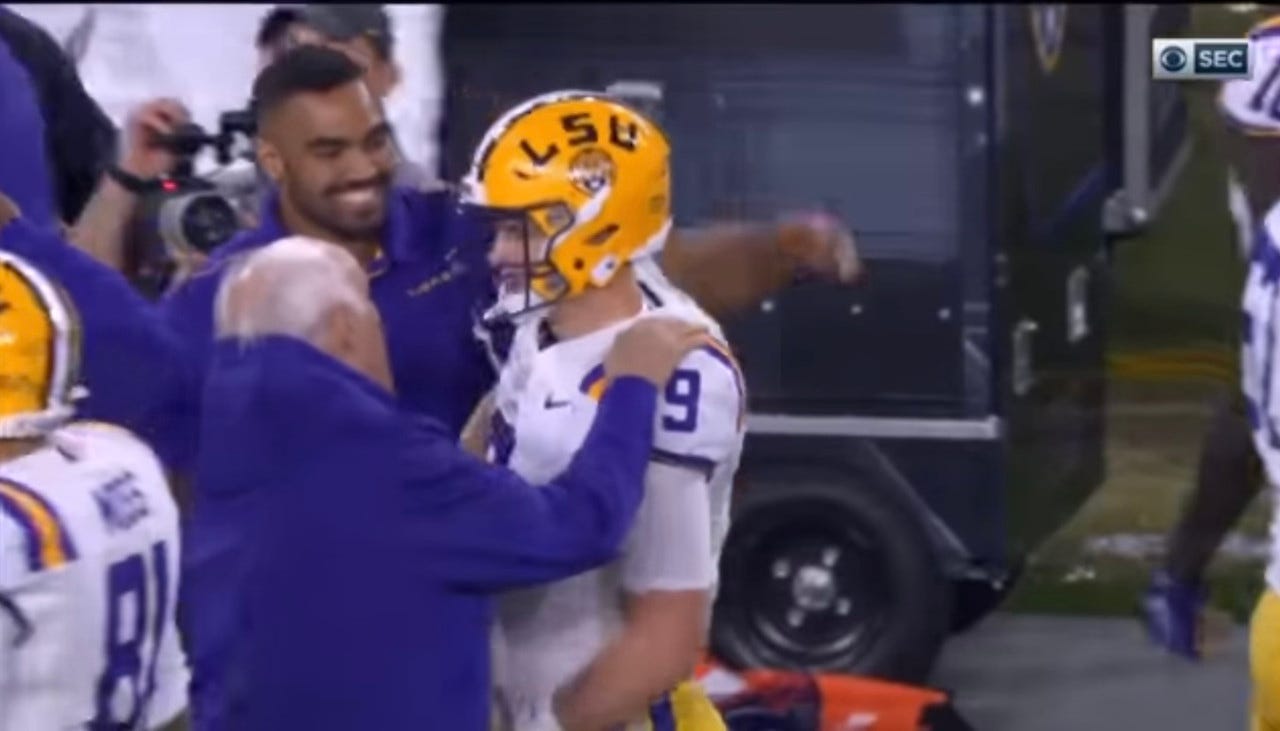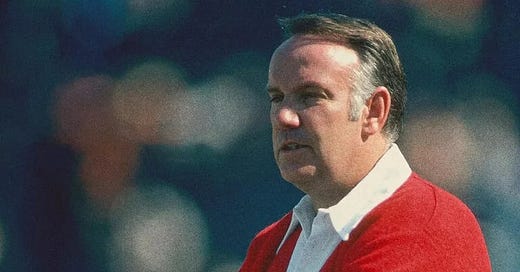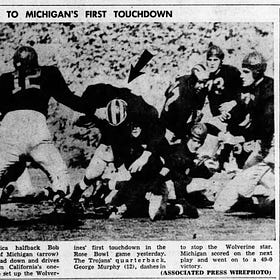On John Robinson and Doing What You Love
College Football Hall of Famer John Robinson worked with Heisman winners and national champions across multiple generations.
The lede of Chris Dufresne’s dispatch from the 2020 BCS National Championship Game reads as follows:
John Robinson is 84 now and seems as healthy as a man his age can rightfully expect to be. He has diabetes, yeah, and an irregular heartbeat, yeah, and can’t remember names.
Yeah, yeah, yeah.
It’s hard to revisit this in November 2024, now that neither subject nor author are with us. College Football Hall of Fame coach John Robinson died on this Veterans Day at 89. Complications from pneumonia, says the official statement on Robinson’s passing. At his age, though, and with the assortment of health issues Dufresne cites, no single cause of death would be especially surprising.
Conversely, when Dufresne died in May 2020, I was stunned. I still am, a realization that came to me while writing these words. I have written before in this newsletter about what Dufresne meant to me: I sought out the Los Angeles Times while in Arizona specifically to read his work and aspired to be a commentator in his style.
Years later, after moving to California, I struck up a friendship with Dufresne while covering many of the same events. He dispelled the cliché advising one to never meet their heroes.
Dufresne could have understandably had an ego; that isn’t uncommon in the media industry. He could have been jaded, and justifiably so. Again, not uncommon.
But even after the Los Angeles Times squeezed him out — because why would a newspaper want the best damn college football writer of a generation on its staff? — he was still a fixture at the Los Angeles Memorial Coliseum and the Rose Bowl; still at the Pac-12 Championship; still covering the sport’s biggest events with the same vigor and writing with the same sharp wit that made me a fan when I was a kid. And he was always kind.
I’m spending this time in a newsletter ostensibly about John Robinson instead heaping praise on the late Chris Dufresne for a few reasons. For one thing, I never knew John Robinson, though I know of his prominence in Los Angeles.
The coach is synonymous with football in the Southland, having had two tenures at USC that bookended a meteoric rise and sudden decline heading up the NFL’s Rams.
Robinson had the difficult task of twice taking head coaching posts with enormous expectations. The USC teams of the ’70s, on which Robinson was an assistant to John McKay, were some of the best in the program’s illustrious history. Likewise, he took over the Rams just three years removed from a Super Bowl appearance at the end of a dominant decade for the franchise.
But Robinson performed admirably in high-pressure situations. His national championship-winning Trojans in 1978 claimed the program’s last title, bridging the dynasties of the John McKay and Pete Carroll eras.
Robinson’s title-clinching Rose Bowl win over Michigan may be the most thrilling of the 11 all-time matchups between the Trojans and Wolverines.
Top 10 Tuesday: Every USC-Michigan College Football Game Before 2024
USC vs. Michigan was precisely the sort of matchup that promised college football fans a compelling reason for the carving up of regional conferences. Will restructuring the sport to resemble the NFL pay off?
The era of Robinson’s coaching career that I witnessed firsthand was his second, less successful go-around at USC. But while his tenure in the ’90s failed to produce another national championship, he won his fourth Rose Bowl in the 1995 season.
Robinson’s status as a football fixture of Los Angeles was well-earned. And, like most L.A.-based football figures from the late ’80s into the 21st century, Dufresne chronicled much of Robinson’s exploits.
To that end, there’s bittersweet poetry in the last major college football event from which Dufresne filed one of his trademark columns being on Robinson. It’s a typically outstanding piece of writing that reintroduces Robinson’s significance to the history of the game, while contextualizing it within the modern landscape.
Football changed so dramatically in the almost 40 years between Robinson’s time spent with Heisman Trophy winners. The brand of football USC played with Charles White and Marcus Allen pounding the rock is almost unrecognizable compared to the air-it-out LSU offense with Joe Burrow in 2019.
But Robinson embracing the latter style later in life speaks to the true nature of why he stayed active into his mid-80s: John Robinson simply loved football.

That love was infectious for his players, according to one of Robinson’s Heisman-winning pupils, Marcus Allen. The all-time USC single-season rushing leader issued a statement hours after Robinson’s death, saying:
“Words are inadequate for a person that has impacted your life in such a way; you can’t even describe it. The impact John had on his players, particularly myself, is so deep and profound. Knowing him was life-changing. He was a great man and a great coach. I love him so much. He was one of the greatest teachers, motivators and psychologists of all-time. Everything we were on the field was a reflection of him.”
My lone experience ever covering a John Robinson-coached team came in 2010. I was a punk in my 20s, just a few years removed from J-school, covering prep football for the now-defunct North County Times.
I was assigned a game between San Marcos High School and Mount Carmel, a matchup pivotal to both teams’ CIF playoff aspirations. The SMHS Knights won, 24-14, and in the postgame huddle, I spotted Robinson, patting youngsters on the back and praising them for their dedication.
That year, John Robinson — national championship winner, two-time NFC Championship Game coach, and an inductee to the Hall of Fame a year prior — was coordinating the defense at San Marcos High.
If there’s one quality I’d like to take away from people like Chris Dufresne and John Robinson, it’s continuing to pursue the things I love with unwavering passion, regardless of age or circumstance.




